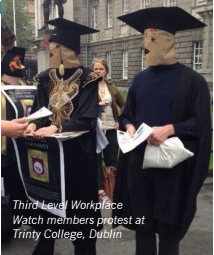Dara McHugh reports.
Poor pay, working conditions and insecure employment have been highlighted in a survey of academic workers. According to the survey of over 180 academic staff conducted by Third Level Workplace Watch, 63% of those surveyed were paid by the hour, while 57% had been doing casual work for five years or more. The survey also highlighted the growth of free labour in the third-level sector, including the increasing use of JobBridge employees, payment of book tokens in lieu of wages, and off-hours work being unpaid.
According to a Third Level Workplace Watch spokesperson, this is part of a trend towards precarious employment in academia.
“Permanent jobs increasingly disappear in favour of low-paid, temporary employment. Such work comes without security, proper remuneration or benefits. The average wage for hourly paid academics amounted to less than €10,000 a year. Many have to supplement incomes with social welfare.”
The survey draws attention to the disproportionate effect of precarious work on women, with 62% of the casual workers surveyed being women. They argue that these conditions limit academic freedom and damage the job prospects of staff.
Permanent jobs increasingly disappear in favour of low-paid, precarious employment
Union representatives for the sector concurred with the findings of the survey. SIPTU Education Sector organiser, Louise O’Reilly, commented: “We are acing on a daily basis situations which reflect the results in our universities. What makes matters worse is that the academics themselves are often afraid to come forward as they are worried for their jobs. The best advice we can give them is to join a union and link with their colleagues.”
Mike Jennings, General Secretary of IFUT said: “There has been an alarming increase in part-time, fixed-term and other forms of precarious and insecure employment in the Higher Education Sector, including universities, in the last number of years. Currently, some 60% of IFUT’s workload is taken up dealing with such cases.
“Despite the Government’s often-repeated claim that research is one of our national priorities, it remains the disgraceful fact that practically every single full-time researcher in the university sector is given fixed-term insecure contracts as a matter of routine. IFUT has taken tens of cases seeking to have such workers made permanent. Practically every one of these was opposed tooth and nail by the universities at the explicit request of the Department of Education”.
He added: “There is no doubt about it that the Irish university sector is one of the worst sectors in the country for keeping people in insecure employment contracts and it is something that IFUT deals with every day and with increasing frustration given the indifference displayed at Government level.”
According to O’Reilly: “Our universities and colleges are made up of workers in many different roles and that all of these roles need to be respected. A lecturer who is not free to think is not Third Level Workplace Watch members protest at Trinty College, Dublinfree to lecture and she or he must be allowed to do their work without interference. Likewise we maintain that students do not want those whom they deal with in our universities and colleges to be disrespected in their work – no matter what that work is.”
Third Level Workplace Watch is a collective of precarious workers organising to defend wages and working conditions in the third-level sector. A spokesperson told LookLeft: “Unfair working conditions often remain hidden in any critical calls to highlight how the higher education is under threat. We feel any discussions on the third-level sector must first and foremost address the casualisation of labour and exploitative workplace practices that allow universities and colleges to function.”





